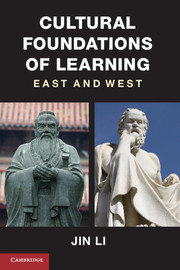Book contents
- Frontmatter
- Contents
- Preface
- 1 Faust and the Birth of a Research Agenda
- 2 Learning to Master the Universe and to Transform Self
- 3 Time Past and Time Present
- 4 Mind-Oriented and Virtue-Oriented Learning Processes
- 5 Curiosity Begets Inquiry and Heart Begets Dedication
- 6 Nerd’s Hell and Nerd’s Haven
- 7 Socratic and Confucian Tutors at Home
- 8 The Devil’s Advocate and the Reluctant Speaker
- 9 Implications for the Changing Landscape of Learning
- Bibliography
- Index
7 - Socratic and Confucian Tutors at Home
Published online by Cambridge University Press: 05 June 2012
- Frontmatter
- Contents
- Preface
- 1 Faust and the Birth of a Research Agenda
- 2 Learning to Master the Universe and to Transform Self
- 3 Time Past and Time Present
- 4 Mind-Oriented and Virtue-Oriented Learning Processes
- 5 Curiosity Begets Inquiry and Heart Begets Dedication
- 6 Nerd’s Hell and Nerd’s Haven
- 7 Socratic and Confucian Tutors at Home
- 8 The Devil’s Advocate and the Reluctant Speaker
- 9 Implications for the Changing Landscape of Learning
- Bibliography
- Index
Summary
Where do children’s learning beliefs come from? Do they come from their inborn capacity, or from their social and cultural environment? This seemingly prosaic question is actually far from being so as it lies at the heart of the persistent debate about nature and nurture. This very question is also at the center of the never-ending debate on parenting styles and child outcomes. We know that children are born with capacity to learn. But we also know that no child is born with set learning beliefs (or any beliefs, for that matter). Their learning beliefs develop as they grow older. Because children acquire different learning beliefs that reflect their cultural learning models, I focus on the sociocultural contribution to their developing learning beliefs. In this chapter, I hope to show that European-American homes are full of Socratic tutors whereas Chinese homes host plenty of Confucian tutors. These tutors are the parents who use culturally informed strategies to foster learning beliefs in their children.
MOST WILLING AND EFFECTIVE EXECUTORS OF CULTURAL PRESCRIPTIONS
It is a truism that home is where children are nourished and loved, which is undoubtedly the foundation for human survival and well-being. But home, as anthropologists have long discovered, also does for humans something extraordinary, yet largely unnoticeable: It serves as the most fertile ground for the transmission, maintenance, and renewal of culture, any culture. Richard Shweder, a leader in cultural psychology, wrote recently that the task of cultural psychologists is to describe and understand cultural prescriptions and how such prescriptions are carried out in child development. By “prescriptions” Shweder meant the values and preferences held by culture that inform childrearing practices.
- Type
- Chapter
- Information
- Cultural Foundations of LearningEast and West, pp. 223 - 275Publisher: Cambridge University PressPrint publication year: 2012



